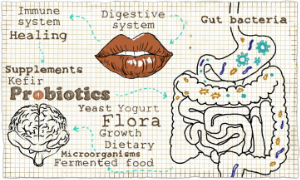A recent Podcast by Vox’s Unexplainable ventured into the hot topic of gut health and its impact on both physical and mental well-being. A full transcript of the Podcast “Your Gut’s Feelings” can be found on Vox’s website here. From Tiktok influencers to big pharma, gut health is one of the premier talking points in a world of people looking to feel better, look better and be in better health. But what impact does gut bacteria actually have on your emotional health, on your physical health? Let’s take a deeper look at gut bacteria, probiotics, and the latest fads obsessing the health-conscious.
What do IBS, stress, mood disorders, and anxiety have in common? Poor gut health? But what does the actual scientific evidence say? According to Dr. Katerina Johnson, a University of Oxford biologist and gut microbiome researcher, there is mounting evidence that gut bacteria directly impacts personality traits (at least in our rodent friends).
During the experiment, mice were divided into two groups, one that displayed stress and anxiety behaviors and another that exhibited boldness and adventurous traits. A “Fecal microbiota transplant” was performed.
Researchers found that both sets of mice were impacted by the transplant, with the timid mice becoming bold and the bold mice exhibiting more anxious behaviors. Since this groundbreaking research, multiple follow-up studies have continued to draw connections between the gut and mood/personality traits. But this study was confined to mice, making the pressing question, would results in human studies mirror the same results?
This question is beginning to be answered. Gut microbiota from depressed humans, implanted into mice, correlated to both behavioral and physiological changes in the mice that would indicate depression. Interestingly and unexpectedly, these animals also developed a “pro-inflammatory” profile. That means their immune system was more reactive to the environment around them, increasing their physiological stress symptoms.
So, what about human trials in fecal microbiota transplants? According to the National Institute of Health FMT information page found here, both short and long-term adverse events are possible for this well-tolerated procedure, including:
| Short Term Adverse Events | Long Term Adverse Events | ||
|---|---|---|---|
|
|
And, if you are thinking that death seems much more aligned with a long-term adverse event, for the record, we couldn’t agree more.
So far, according to Dr. Johnson, FMTs are generally only performed in dealing with cases of C. Diff or other severe intestinal issues. However, researchers are piggybacking off these medically necessary FMTs and reviewing data for unanticipated impacts. The results are intriguing.
According to Johnson, “There’s started being some interesting observations in these patients that had had the fecal transplant for Clostridium difficile, and then they found that ameliorated other conditions that they had, for example, depression, and chronic fatigue.” Johnson went on to say that FMTs were also shown to improve the psychiatric symptoms in individuals who received transplants for irritable bowel syndrome.
Inspired by both the expected and unexpected results, Dr. Johnson conducted her own research. With a pool of 600 individuals, data was collected, including personality traits, diet, lifestyle, and life history. Then participants sent fecal samples for analysis. On the results, Johnson stated, “I found that sociable people have a higher abundance of certain types of bacteria. O, you know, we know from kind of like animal studies that the gut microbiome can affect how likely they are to interact socially. So, the fact that I find that these specific gut bacteria are also differentially abundant in humans in relation to their social behavior does suggest that the gut microbiome may contribute to variations in social behavior that we see in the general population as well.” Gut diversity may be impacted by a person’s sociability as well, since more social individuals seemed to have a greater variety of microbiomes as well.
The hows of this process are still barely understood. However, answers may be on the horizon. Dr. Michael Gershon, often referred to as the father of the enteric nervous system, has been studying gut “intelligence” since the 1960s. Gershon’s theory is that mammal guts have “brains” of their own, a type of second brain due to the exceptionally large number of nerve cells found in their structures. Gershon states, “the gut is like a middle manager, and the brain is more like a hands-off CEO. It delegates.”
Through the vagus nerve, which connects the gut to the brain, a direct line of communication is established. Through this communication, the gut sends information like satiety, hunger, and possibly data related to mood and anxiety. The gut microbes work on breaking down food, and fighting bad bacteria by synthesizing enzymes and generating waste. Interestingly, these microbes also make neurotransmitters like serotonin, dopamine, GABA, noradrenaline, histamine, and acetylcholine. In fact, only 5% of serotonin is located in the brain, and the remaining 95% is found within the gut.
There are many additional questions that need to be explored and answered. As Dr. Johnson states, “We don’t really know the relative importance of these kind of different mechanisms.” So, let’s get back to the primary question of the day, probiotics, yay or nay?
Unfortunately, the data just isn’t in. Dr. Johnson, however, has high hopes for the future of gut health and probiotics, “A lot of the excitement around the microbiome field is well founded. Like, it’s at the center of our physiology. It can affect the immune system, it can affect our nervous system, it can affect our hormones.” But gut microbiomes are only one section of a much larger piece of the puzzle. So, maybe grab those probiotics and give them a shot, but only as a part of your overall health and wellness plan.

